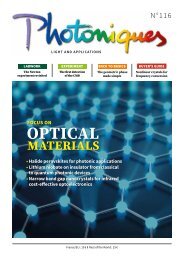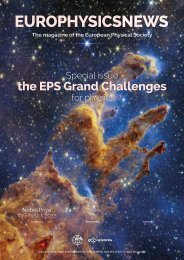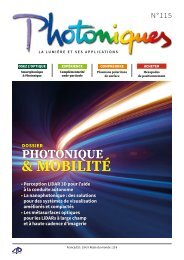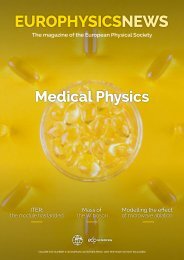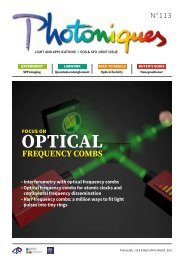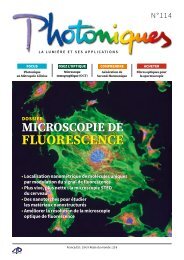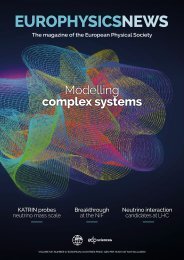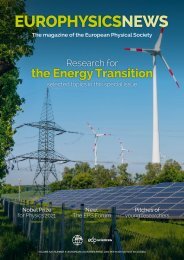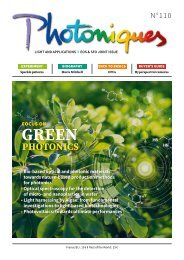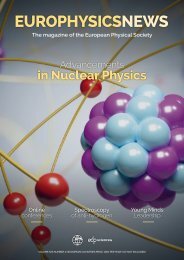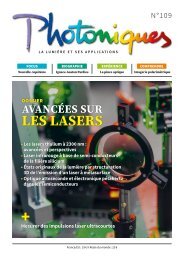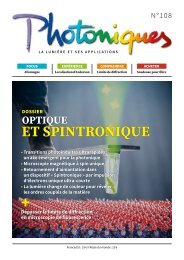Europhysics News 53-4
Europhysics News Quantum Issue
Europhysics News Quantum Issue
You also want an ePaper? Increase the reach of your titles
YUMPU automatically turns print PDFs into web optimized ePapers that Google loves.
IN THE SPOTLIGHTS<br />
Highlight from EPJ<br />
Quantum control for advanced technology:<br />
Past and present<br />
Quantum devices are a promising technological advance for the future, but this will<br />
hinge on the application of quantum optimal control top real-world devices. A new<br />
review looks at the status of the field as it stands.<br />
One of the cornerstones<br />
of the implementation<br />
of quantum technology<br />
is the creation and manipulation<br />
of the shape of external<br />
fields that can optimise the performance<br />
of quantum devices. Known<br />
as quantum optimal control, this set<br />
of methods comprises a field that has<br />
rapidly evolved and expanded over<br />
recent years.<br />
A new review paper published in<br />
EPJ Quantum Technology and authored<br />
by Christiane P. Koch, Dahlem<br />
Center for Complex Quantum<br />
Systems and Fachbereich Physik,<br />
Freie Universität Berlin along with colleagues<br />
from across Europe assesses recent<br />
progress in the understanding of<br />
the controllability of quantum systems<br />
as well as the application of quantum<br />
control to quantum technologies. As<br />
such, it lays out a potential roadmap<br />
for future technology.<br />
While quantum optimal control<br />
builds on conventional control theory<br />
encompassing the interface of applied<br />
mathematics, engineering, and physics,<br />
it must also factor in the quirks<br />
and counter-intuitive nature of quantum<br />
physics.<br />
This includes superposition, the<br />
concept that a quantum system can<br />
exist in multiple states at one time, one<br />
of the keys to the advanced computing<br />
power of machines that rely on quantum<br />
bits — or qubits.<br />
Ultimately the main goal of quantum<br />
optimal control is to make emerging<br />
quantum technologies operate at<br />
their optimal performance and reach<br />
physical limits.<br />
“Each device architecture comes<br />
with specific limits but these limits are<br />
often not attained by more traditional<br />
ways to operate the device,” Koch says.<br />
“Using pulse shaping may push the devices<br />
to the limits in terms of accuracy<br />
or operation speed that is fundamentally<br />
possible.”<br />
The authors of this review consider<br />
factors in the discipline including the<br />
extent to which a quantum system<br />
can be established, controlled and observed<br />
without causing this superposition<br />
to collapse, something which<br />
seriously impedes the stability of quantum<br />
computers.<br />
The review also suggests that just as<br />
conventional engineers have a control<br />
theoretical framework to rely on, the<br />
training of future “quantum engineers”<br />
may require a similar framework which<br />
is yet to be developed.<br />
m A new review<br />
lays out a<br />
roadmap for<br />
quantum<br />
technologies.<br />
Credit:<br />
Robert Lea<br />
A quantum system that unifies theory<br />
and experiment is one of the current<br />
research goals of the field with the<br />
authors pointing out that this will also<br />
form the basis for the development of<br />
optimal control strategies.<br />
As well as assessing the recent progress<br />
towards this goal, the team lay<br />
out some of the roadblocks that may<br />
lie ahead for the field. Roadblocks<br />
that will need to be overcome if a<br />
quantum technological future is to<br />
be manifested. n<br />
Reference<br />
[1] C.P. Koch, U. Boscain, T. Calarco et al.,<br />
EPJ Quantum Technol. 9, 19 (2022).<br />
https://doi.org/10.1140/epjqt/s40507-<br />
022-00138-x<br />
12 EPN <strong>53</strong>/4



